The Euro 2022 tournament is only a few months away, and many teams are continuing their preparations by competing in a variety of invitational tournaments. One team who will be determined to shine this summer is hosts England, especially as this is their first major tournament since the appointment of Sarina Wiegman as head coach, and she will no doubt want her players to demonstrate that they are turning a corner and becoming a force in women’s football again.
In order to assess how well the Lionesses are progressing, this tactical analysis will look at their performances in the inaugural Arnold Clark Cup, where they have so far faced Olympic champions Canada and one of the Euro 2022 title favourites, Spain. The scout report will dissect their key tactics in both attack and defence, as well as identifying some of the areas that they still need to improve in.
Attack
Sarina Wiegman has not needed to improve England’s attack too much, as they already had plenty of quality going forwards and an ability to score goals during matches. Instead, what has become evident during her tenure is that she has focused on introducing key tactical concepts that have made their play more streamlined and productive, and this has been helped by the quantity of players available to her.

One very noticeable feature is that she tends to put players in positions that suit their strengths, but that aren’t necessarily where they play their club football. For example, Arsenal Women centre-back Leah Williamson, who has captained the team in the absence of Steph Houghton, has tended to operate as a midfielder for the national team, as her excellent ball distribution has led to Wiegman seeing her as more of a deep-lying playmaker. Manchester United Women’s Ella Toone has tended to be a playmaker behind the front line, as she was last season at Leigh Sports Village under Casey Stoney, whereas she has this season played as a left-sided attacker or a false nine under Marc Skinner.
This flexibility has led to England using spaces more efficiently, with players knowing where they can affect the game, and this situation shows Jill Scott, currently on loan at Aston Villa Women from Manchester City Women, in between the Spanish players, looking to set up an opportunity further forward. With players using these spaces, England have been able to keep the ball moving forwards much more, maintaining their attacking momentum. As this was a key aspect of the Netherlands’ play during Wiegman’s time in charge there, it is evident that she has implemented this movement and confidence, and it is really benefitting them.

Another key aspect of the Netherlands’ tactics in attack was a good use of the wide channels, with the full-backs encouraged to get up the pitch and support play by making it as big is possible, and this is something else we have seen a lot of in England’s play too. This forces the opposing defenders into making choices about whether to keep a narrow shape and limit the influence of the central attackers, or to move out and try to prevent balls from coming into the middle.
Both Canada and Spain generally opted for the former, which gave England the opportunity to constantly move the ball out to the wings, and their passing accuracy of 80.3% shows that they have been decisive and composed when doing so. However, when England face an opponent that chooses instead to close down the wingers, they also have players in the middle who can make runs behind and give the wingers earlier passing options, and this tactical flexibility will be something else that they will benefit from when looking to break defences down.
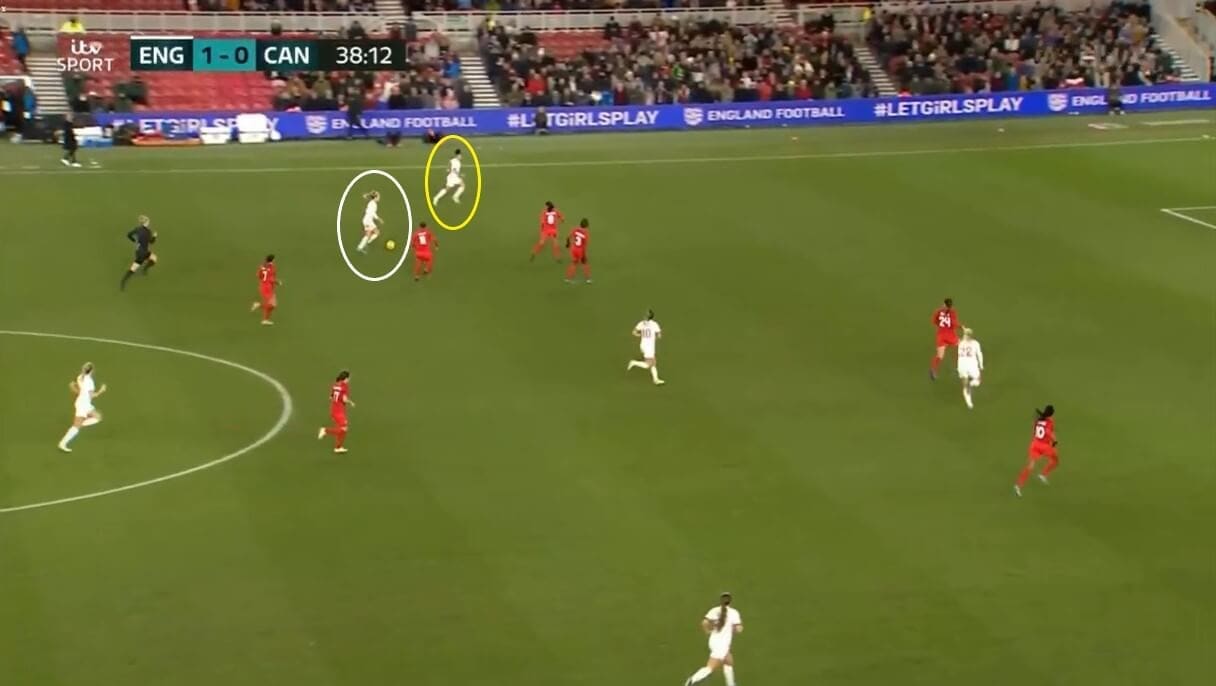
Another positive of the full-backs advancing up the pitch is that England can create numerical overloads on the wings, with the result being that the wide forwards have the ability to cut inside and operate either in the middle or in the half-spaces, which are always difficult to defend against.
England’s best attacker so far in the Arnold Clark Cup has been Manchester City winger Lauren Hemp, as she has demonstrated sharp movement and a good eye for goal during their first two games. However, the reason that she has posed such a threat is that her club teammate Demi Stokes and Houston Dash’s Rachel Daly, who has also featured at left-back during the tournament, have made runs up the field to maintain the width on that side of the pitch. It is not only Hemp who has benefitted from this, as Arsenal’s Beth Mead has also been seen in central areas, so it is clear that this is a key part of the Lionesses’ tactics and is something that Wiegman has encouraged, and it is another small detail that could help England to be less predictable and therefore harder for opponents to keep out.
Defence
Defensively, England have also shown strong signs of improvement, especially given that this was one area that they did need to work on. The fact that they kept a clean sheet against a strong Spanish team was partly down to Spain’s lack of quality in the final third, but largely down to the Lionesses’ ability to anticipate play and ensure that they were hard to score against.

When England have lost possession under Wiegman’s leadership, their mindset instantly turns to defence, and that starts with the forwards. Spain looked to play out from the back in the early stages of this game, and so England used Manchester City striker Ellen White’s natural instinct of playing on the front foot to apply pressure and dictate where their opponents passed the ball to.
However, this in itself didn’t win back possession, as Spain are very capable of simply moving the ball around individual players and out of danger. Therefore, the three players behind White had just as important a role in these situations, as they were the ones who took time away from the player receiving the ball. Now, because they couldn’t turn and move it forwards, Spain had to pass the ball back towards their own goal area, as the red lines show, which was where England pounced. When in this structure, the Lionesses knew that they only needed to be patient and wait for the chance to arrive, and their 42 interceptions across both games indicate that this was something they have done well.
From this situation, Hemp, who made the interception, was able to shoot at goal and ended up hitting the post, but she had the space and could have easily found the back of the net on another day. Therefore, England are just as big a threat without the ball as they are with it, and this will please fans as the summer draws nearer.
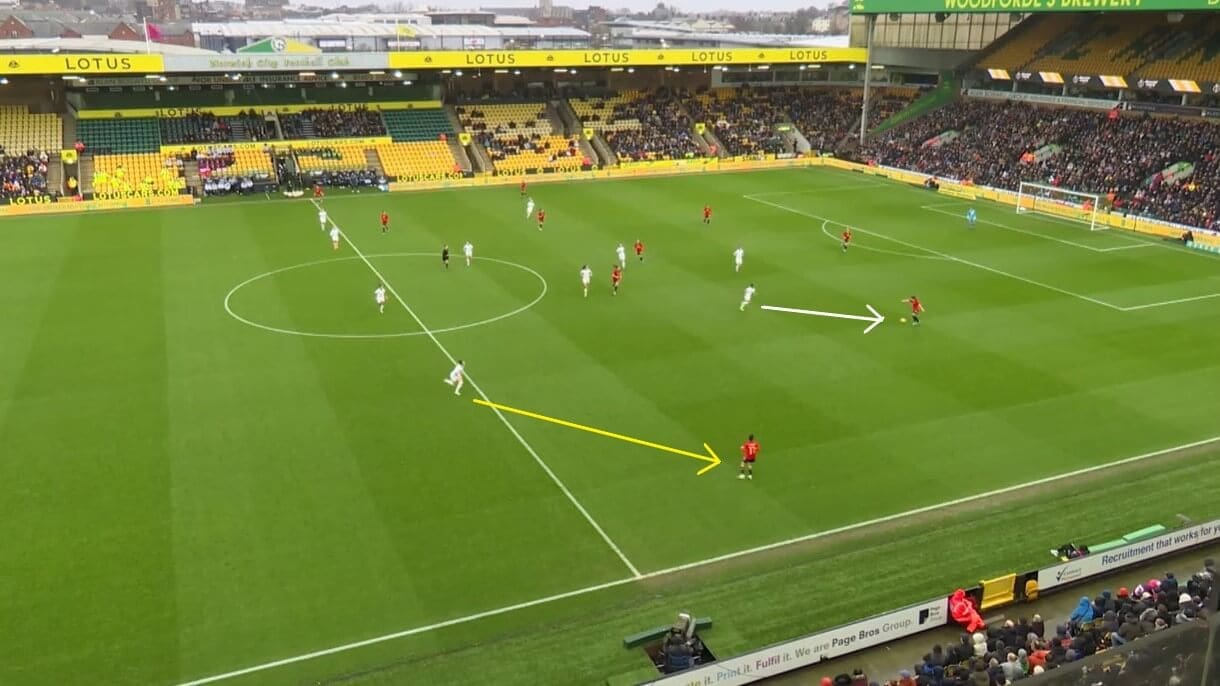
When the ball was successfully played out by their opponents, England used a different tactic to keep control of the game. Here, Spain have possession, but are being closed down by an attacker, and need to move the ball quickly to avoid it being taken off them. The obvious pass to make is towards the nearside wing, where there is a player waiting, but England have seen this, with Bronze moving to cover that player and prevent the ball travelling in that direction. As a result, Spain no longer have any viable passing options available to them, meaning that they have to turn and pass backwards instead.
As mentioned, defending was something that England needed to work on after Wiegman’s arrival, and this level of organisation and anticipation is the result of the work she has done with them on the training ground. Spain do have issues in the final third with turning opportunities into goals, but England’s defensive play also deserves some credit, and it is another reason that fans can expect good things when the Euros arrive.
Areas to work on
Whilst we have identified several positives in England’s attacking and defensive play during the Arnold Clark Cup, we also need to highlight a few areas where they need to keep working, and the good news is that these can all be easily addressed.
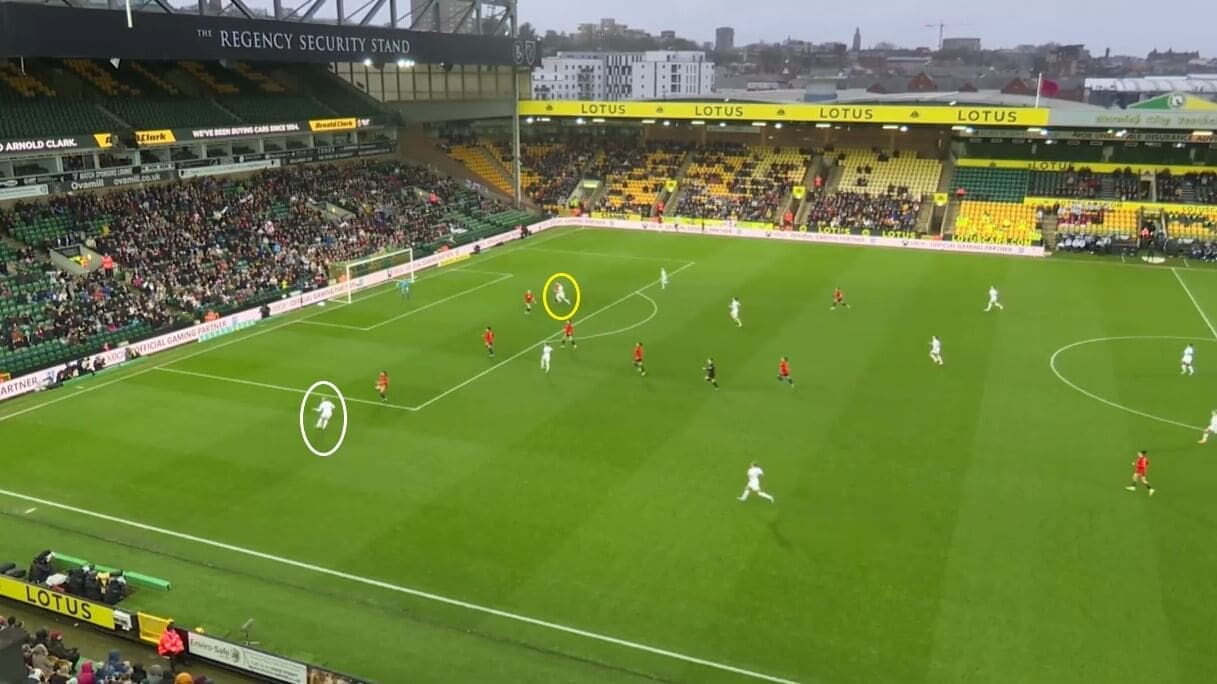
The first comes in their attacking play, and is to do with the final pass. As mentioned, England found themselves in plenty of dangerous areas against both Canada and Spain, but wasted a number of opportunities to turn those chances into goals. The fact that they have only scored one goal in their two games so far is perhaps an indication that they need to be more productive, and having more precision with their crosses into the middle is a good way to start fixing this, given that they only have a 35.1% crossing accuracy in the tournament so far.
This situation is a good example of what has often happened, with Hemp in possession and in a good position to set up White in the box. However, her cross goes behind her teammate, which allows Spain to comfortably win the ball and clear their lines. Fortunately, England didn’t lose this game, but a loss against Germany in their final match would lead to questions about why they weren’t able to score more goals, and these situations would be where they would look back and see where things could have been different. Indeed, if they want to progress deep into the Euro 2022 knockout stages, then they will need to be more ruthless in the opposing third and convert these chances with more regularity.
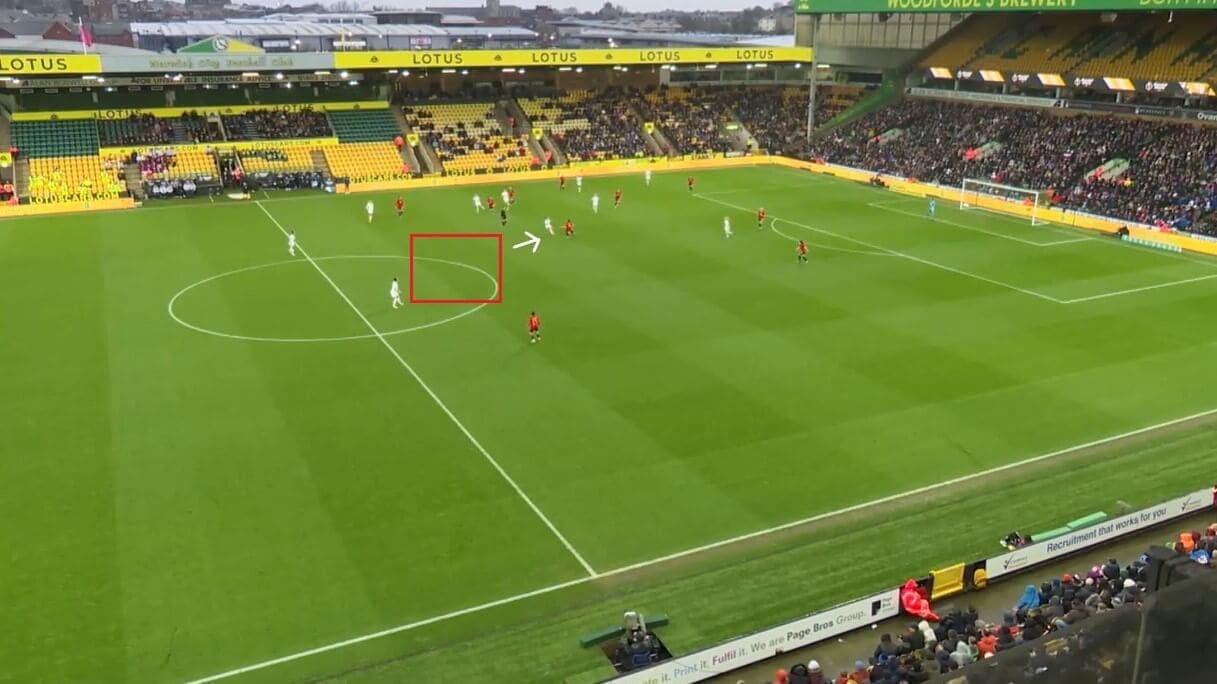
Another area that they need to keep an eye on is closing the ball down when out of possession. England should be praised for having the desire to want to win the ball, rather than waiting for it to come to them, and the fact that they have won 65.3% of their defensive duels shows that, on the whole, they do time their movements well.
However, on the occasions when they get it wrong, they end up leaving spaces open for opposing attackers to exploit, as was the case here. We saw earlier in the analysis that the Lionesses like to use spaces that their opponents have left open, but they need to be mindful of allowing opponents to do the same thing against them. On this occasion, Spain were able to turn around England and move into the area marked by the red square, with the defenders left on their own to stop the attack, and that is the danger. Whilst this is not something that requires attention, it could be what makes the difference in a tight game during the summer.
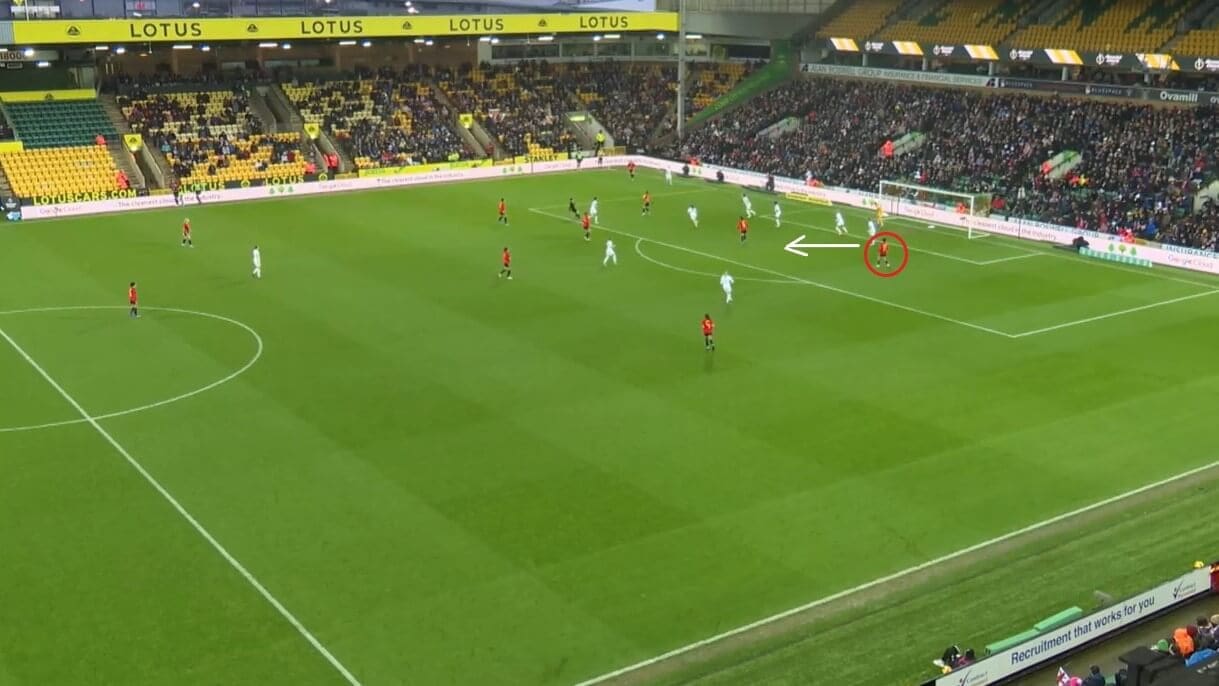
On a similar note, this image shows the ball on the edge of England’s goal area, with the defence set up well and making it difficult for Spain to create a shooting opportunity. However, once the ball reaches the player directly in front of the defensive line, the defenders are all drawn towards it, trying to clear their lines. Whilst their intent is good, as it again shows that they want to win the ball, it does leave them exposed behind, and the next pass to Athletic Bilbao Femenino forward Lucía García (in the red circle) almost results in a goal. England were let off, as García lacked composure with her effort, but this was still a warning for them, and will remind them that they can’t lose their concentration against top teams, as they will capitalise on these slight mistakes.
Conclusion
In conclusion, this tactical analysis has looked in detail at England’s performances against Canada and Spain in the Arnold Clark Cup, picking out the positives in their attack and defence and identifying where Sarina Wiegman has helped them to play with more fluidity and confidence. However, there are still some areas where they need to keep working, and getting these details right could be what decides close games, so it will be interesting to keep an eye on how they continue to develop as we near the start of this summer’s tournament.
After their trips to Middlesbrough’s Riverside Stadium (Canada) and Norwich City’s Carrow Road (Spain), England complete their Arnold Clark Cup campaign against Germany on Wednesday evening, with that game taking place at Wolves’ Molineux Stadium. Germany are a team with a flexible formation that sees their players move around the pitch and create plenty of options, whilst they also have plenty of pace from the likes of young Hoffenheim Frauen winger Jule Brand (who will join giants Wolfsburg Frauen in the summer). Therefore, it will be a different test for England, but their form under Wiegman so far should give them hope of another positive result, and yet more progress as they continue to build towards their home Euro tournament.





Comments